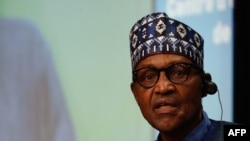Nigeria's President Muhammadu Buhari has formally opened resettlement houses for people internally displaced by the 13-year conflict with Islamist militants in the country's northeast.
Buhari's visit Thursday to Borno state, the epicenter of Nigeria's Islamist insurgency, was part of activities to commemorate the U.N.-declared World Humanitarian Day.
Buhari commissioned 500 units of newly built resettlement homes in a local Molai village. The president also donated food items, including rice, beans and cooking oil, to thousands of internally displaced people.
Nigerian authorities also announced a cash transfer for over 5,000 beneficiaries, most of them women and people living with disabilities.
Since last year, authorities have intensified efforts to close IDP camps in the state and settle residents in their home villages and towns.
Local media report more than 6,000 housing units have so far been completed and allocated to beneficiaries.
However, aid groups have been raising concerns about the safety of the IDPs. Abba Ali Yarima, co-founder of the nonprofit Green Panthers foundation that focuses on ameliorating the impact of climate change, spoke to VOA via phone from Maiduguri.
"People that were relocated are still complaining about access to basic services such as water and health care," Yarima said. "Then we're still having a lot of security issues, but because the northwest is also having a bit of security concern now, it has overshadowed the one in the northeast. There are shocking stories coming from the fields that we don't seem to talk about.”
Buhari praised Nigerian troops and said their efforts have made significant progress toward dislodging the terrorists.
Security analyst Senator Iroegbu agreed but said authorities must remain vigilant and must also introduce community policing in areas where the IDPs are being resettled.
"There's a relative progress and stability in the northeast in the counterinsurgency operation, [but the] military can't effectively do a policing job," Iroegbu said. "If there's a territory that has been liberated, you cannot completely say that it is safe for civilians to relocate. That's where you have other security agencies come into play, so I don't know if the federal government is factoring it."
The United Nations estimates more than 37,000 people have been killed and about 2.8 million people displaced by the insurgency, which began 13 years ago.
The war has spread to other parts of the country and neighboring Cameroon, Niger and Chad.
Yarima said that although attacks persist in the northeast, focus on the humanitarian impact there has been declining and shifting to the northwest, where armed gangs have been active.
"There are attacks in the northeast as much as there are attacks in the northwest, [but] the attention of the media is in the northwest," Yarima said. "This has also exposed a lot of interventions that are supposed to be in the northeast going to the northwest, which is not a bad thing but ... ."
In April, a joint military force from Nigeria, Niger and Cameroon killed more than 100 members of Islamic State West Africa Province, including 10 commanders.
But critics say until ISWAP and Boko Haram can no longer carry out attacks, returning home for many displaced people will remain a big risk.




